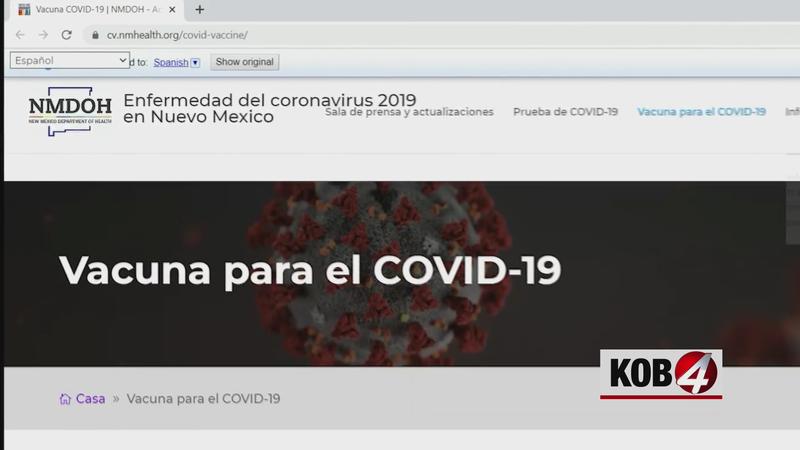UNM research reveals inequalities in COVID-19 information for Spanish-speakers
[anvplayer video=”5032817″ station=”998127″]
ALBUQUERQUE, N.M.- A new analysis from UNM is revealing some startling inequalities in the way New Mexico is communicating critical COVID-19 information to non-English speakers, specifically residents who speak Spanish.
“It’s a life or death situation, simply put,” said Cory Apodaca-Cordova, one of the UNM graduate students involved in the study.
The research examined a variety of communication methods, including the flashing billboards set up along New Mexico’s major roads.
Since the onset of the pandemic, the signage has displayed messages about COVID-19, wearing a mask and getting vaccinated.
However, the UNM analysis found almost all of the messages were in English, despite more than a quarter of residents in New Mexico speaking Spanish.

“We found that only one of them was ever listed in Spanish, which was in April of last year 2020,” said UNM graduate student and researcher Rachel Newsom.
Another issue discovered in mid-March 2021 focused on the state’s vaccine registration website. One option allowed users to opt in to a Spanish-translated version of the website, but there were some serious translation problems.
“The translation software that the New Mexico Department of Health uses tried to translate this into Spanish – so for example, Eddy county somewhere, somehow is defined as a windstorm. So then they took windstorm and defined that into Spanish – and that’s “remolino.” said UNM graduate student researcher Victoria Peña-Parr.
In a lengthy statement provided to the KOB 4 Investigates team, the NMDOH admits the technology used is an “imperfect technology.”
The issue with the vaccine registration was eventually flagged and resolved several weeks later.
Another potential hurdle to information highlighted in the report centers around the state’s Covid-19 hotline.
“It gives you a list of resources and it never offers a translation in Spanish – or you know – an option to switch to Spanish on that,” said Newsom.
Speaking broadly on the issue of equal access to COVID-19 information, NMDOH spokesperson David Morgan said: “There’s no question that providing public health information during this pandemic in a form that accurately conveys information to all New Mexicans is a top priority."
"There’s more work to do in the short run; we can do better as communicators, and we will," Morgan added later.
The state also provided this list of all the outreach work they’ve done to connect with vulnerable communities:
- The OHE has hired in-house, rapid translation of all Covid-related material into Spanish, Vietnamese, Dine/Navajo and Arabic in appropriate health literacy levels to reach border, frontier, colonias, immigrant, refugee and asylum-seeking community members. Materials are distributed state-wide.
- OHE has forged partnerships or strengthened existing collaboration ties with minority, special-interest groups and faith-based organizations statewide to promote inclusivity, transparency, and accurate representation. These action items have resulted in multiple, state-wide, culturally and linguistically-appropriate Virtual Town Halls featuring trusted messengers of the community and have included Black and African-American, Mono-lingual Spanish speaking Latinx community members, Spanish-speaking health care providers in the border region, the American Asian/Pacific Islander (API) community, and Individuals living with Disabilities community.
- Virtual Town Halls are contracted with a local Community Based Organization/Faith Based Organization, streamed live on Facebook with panelists of trusted messengers from that particular community, along w/ DOH leadership, and archived onto YouTube and DOH social media.
- Town Halls are frequently followed up by scheduling priority vaccination clinics (w/ Planning, Ops and Logistics teams) aimed at the target population to promote increased vaccine confidence and promoted through local agencies including health councils, churches, synagogues, and places of worship.
- Examples of such include priority vax events state-wide aimed at the Black/African American community in rural areas (Farmington, Hobbs, Alamogordo, Clovis, Roswell, etc.), as well as small scale mobile vaccination events located in the Southwest side of town and in the International District in metropolitan Albuquerque, (offering extended & weekend hours and on the bus line) prioritizing essential workers and the API community, and the mobile clinics at 3 churches in Santa Fe prioritizing faith-based and/or socially-vulnerable community members.
- For our call center, we also have a language line for translation services, but also people in the call center who speak Spanish. These translation services can also be utilized for many other languages spoken by residents seeking answers to their questions.
- Press conferences also are routinely providing simulcast in Spanish on the Governor’s YouTube page.
NMDOH is encouraging anyone who encounters any issues to report their concerns via email at: COVID.vaccines@state.nm.us